This morning we hit the trail for Eisenach shortly after b-fast. This was the home of Johannes Bach and the site of Lutherhouse – a home where Luther lived as a young man. It was turned into a museum about ten years ago.
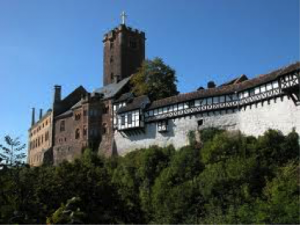
After walking around a bit, we drove two miles outside of town to Wartburg Castle.
- This is where Luther was taken by Frederick the Wise shortly after his disputation with Eck.
- Because the Emperor sided with the council, Luther had been declared a heretic and could be killed on site.
- This is what had happened a hundred years earlier to ??
- Frederick had anticipated this and demanded guarantees of Luther’s protection if he showed up at Worms. He had received them, but he was not convinced they would be honored, so he Luther kidnapped and taken to safety.
- I believe Frederick asked not to know where he was taken so he could deny knowing what was going on.
- Luther was taken to Wartburg castle, where he spent two years under cover as a knight – Junker Jorge.
- Wartburg castle had been around for several hundred years before Luther stayed there. In recent years, it has been turned into a museum. You get to see where Luther lived, translated the Bible, supposedly threw the ink well at the devil, etc.
Note for future visits: the walkways in and around the castle are steep and the cobblestone is very uneven.
After the castle, we headed to Worms – which is where the disputation with Eck took place. It’s a two-hour drive. In Worms, we visited a large Luther square – where the largest Luther statue in the world presides over the town square.
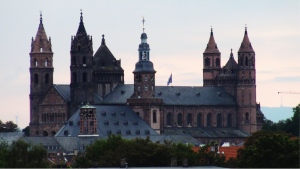
We also went to Saint Peter’s Cathedral, which was remarkable. It is hard to imagine anyone building anything like this today. Back then these buildings took fifty years to build.
Misc:
- One of the takeaways from this visit, is learning that the artist Cranach the Elder, whose painting of Luther I have in my study, was a very prominent figure. I had no idea.
- A second take-away is that Luther was primarily a Bible translator. A few months after he went into the castle, he published a first translation of the New Testament in modern German. He revised it a few months later. This I knew. What I did not know is that he spent the next 12 years working on the Old Testament (with Melanchthon helping him) and that he kept revising the Bible up until his death. I also did not know that because Melanchthon was much better at Greek than he was, Luther focused most of his time and Biblical study on the Old Testament. He is famous for his commentaries on Romans and Galatians, but most of his time was OT not NT.
- A third take-away is that I really need to think more reformations than reformation. There were lots of people trying to reform the church, and of course the Roman Catholics will launch a counter reformation to combat Luther and his allies.
- Throughout this trip I find myself amazed that I am able to be here. The sidewalks we are walking were built 400 years ago. They often do not meet 21st century code – often because they are too steep. Had you told me a few years ago that I’d have enough balance to take a trip like this, I do not think I would have believed it. I am very thankful.
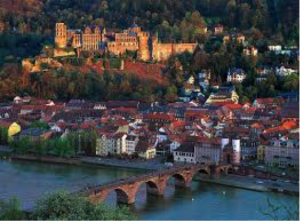
Just back from tour of Heidelberg, a beautiful and very international university town of about 150K.
Via Doug Sweeney, I was able to line up a tour with Ryan Hoselton, an American PhD student studying church history at the University of Heidelberg. Ryan was just what we were looking for.
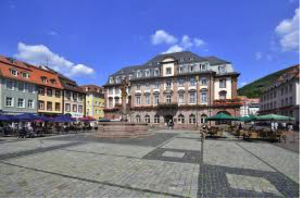
We started in the square that stands over the ruins of the Augustinian monastery that Luther visited six months after he posted his theses. In Heidelberg – which is where the Heidelberg catechism was written – Luther presented this thinking at the once-every-three-year gathering of the Augustinians. (Note: the town square was also the site of a large book burning by the Nazis in 1933).
- He walked there, which likely took close to a month. And which gave him time to think. Instead of the 95 theses, he presented 26 new ones. If you study these lists you see how his thinking was evolving. He was clearer about Justification by faith by this point. He also was emphasizing a theology of the cross (we suffer) versus a theology of glory (we can be good and merit God’s favor
- His defense was initially well received by many of the faculty and students. This would later change.
- At Luther’s request, his defense was held at the university across the street at the university – there is a plaque that marks the spot. Luther insisted on this because he wanted this discussion to be an academic one.
- According to Ryan, Luther appealed to Scripture when debating Catholics and reason when he ended up debating the enthusiasts, Anabaptists and other “radical reformers..
From there we visited a few churches that held significance for various reasons. And then – perhaps the highlight of the trip – was a tour of the castle of Heidelberg. While in town to discuss his theses, Luther was invited to dinner by Count Wolfgang. (He was already becoming a celebrity). The ruins of the castle, which was first built in 1200s, are impressive and apparently important for various reasons.
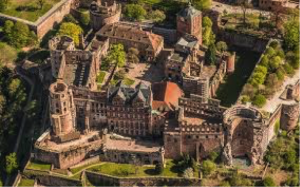
We got an hour tour, by Ralf Brendal, a dry wit who made a fun tour even better.
I had little appreciation for what goes into a castle before this trip. I will not complain about Christ Church’s maintenance budget again. We not only do not need tens of millions to keep any of the buildings running, we get to save money by not needing gun powder to defend the buildings against the ongoing raids.
After the castle, we had a German lunch before heading back to Mannheim.
According to Ryan:
- Most of Germany operates from the political middle of the four largest parties. The policies of Germany’s middle would line up with our left.
- Germans pay a lot in taxes, but there is not a lot of noise about it. They have a vibrant economy and get perks like free tuition for college.
I have now seen groups of Syrians. According to Ryan:
- Most people were accepting of the refugees, though there was / is some fear because ISIS claims to have some of their own among the refugees;
- It is unclear how many will settle in Germany versus go back once Syria settles down;
- Merkel told Christians to read their Bible and open their homes (her father was a pastor. He said it is unclear where she stands on spiritual matters).
- There is some question as to how many more may get in. Most of those who came were men who are now trying to bring their families, but are being prevented from doing so, which is causing some tension;
- One of the reasons many think Merkel let so many in is because they need workers. Germany has a negative growth rate – more Germans are dying than are being born, and anyone who has more than two kids is considered crazy;
- The pastor of the church his family attends, preached a great sermon on the refugees. He noted that though allowing them in may not have lined up with someone’s politics, and though there is some fear about how things will unfold over time; the call to a Christ follower is to love your neighbor.
